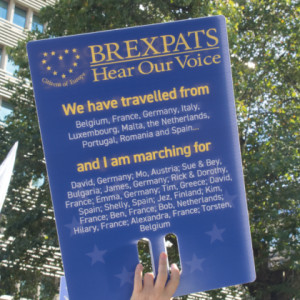The People's Vote
The organisers were expecting 100,000. By mid-afternoon they were saying there were seven times that number. This evening the BBC is reporting that the police have (very unusually) said they were not able to estimate the size of the crowd. That, almost certainly, is because they weren't there - I have never been to a march with so little police presence nor one where the lack of traffic control meant that occupied vehicles were trapped for hours in a sea of marchers. I'm not sure whether the police absence was because they predicted - accurately - that it would be a good-natured event or whether it was their own protest about the swingeing cuts they have faced over the last few years.
The placards showed many perspectives - probably most were simply anti-Brexit - but the stated aim of the march was to demand a final say on the Brexit deal, given that there is such widespread discontent about the proposals that have so far surfaced.
Of course the burning issue is what might be the alternative to whatever deal is proposed: to keep negotiating? to leave with no deal? to abandon Brexit altogether? All those options have serious economic and political implications, which some of us talked about as we walked this afternoon. The one that worries me most is the consequences of a decision that in effect overturns the vote of June 2016.
Disproportionately, the people who voted for Brexit are those who had already suffered most from public spending cuts and already felt themselves to be ignored by the southern elite. Nothing has happened since the vote to make them believe that their economic situation matters either to the government or to the better off. If they are made to feel that voting doesn't work, what next?
A history question from 2118: To what extent was David Cameron responsible for the ending of democracy in the UK?


Comments
Sign in or get an account to comment.


